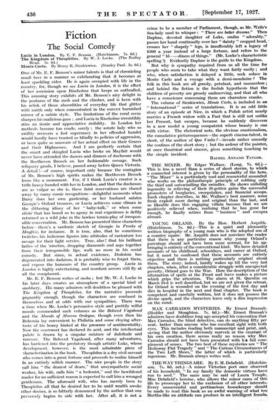Fiction
The Social Comedy Monte Carlo. By Henry K. Sienkiewiez. (Stanley Paul. 2s. 6d.) ONE of Mr. E. F. Benson's minor talents is that of chronicling small beer in a manner so exhilarating that it becomes at
least sparkling cider. He is again occupied with life in the country, for, though we see Lucia in London, it is the effect of her ascension upon Riseholme that keeps us enthralled..-.. This amusing story exhibits all Mr. Benson's airy delight in the postures of the snob and the climber, and is keen with his relish of those absurdities of everyday life that glitter with mirth only when concentrated in the convex burnished mirror of a satiric style. The limitations of the rural scene sharpen his malicious gaze ; and Lucia in Riseholme irresistibly stirs an ironic and appreciative risibility. In London her methods become too crude, surely : the astute lady who so swiftly recovers a lost supremacy in her offended hamlet would hardly have trusted so blindly to policies of aggression, or been quite so unaware of her actual effect on their Graces and their Highnesses. And I am perfectly certain that the smart and shingled Lucia who broke on Mayfair would never have attended the dances and dinners of duchesses with the Beethoven Brooch on her fashionable corsage. Such reliquary gauds, I believe, passed away before Queen Victoria. A detail !—of course, important only because the contagion of Mr. Benson's high spirits makes the Beethoven Brooch loom like a monument. For, if I think Lucia's creator is a trifle heavy-handed with her in London, and that the duchesses are as vulgar as she is, these faint reservations are chased away by many comic recognitions—delightful moments when Daisy does her own gardening, or her husband salutes Georgie's Oxford trousers, or Lucia achieves some climax in the dithering idiocy of her "baby-talk," or when some cliche that has bored us to agony in real experience is deftly returned as a wild joke in the lawless tennis-play of irrespon- sible conversation. Mr. Benson has presented these characters before—there's a sardonic sketch of Georgie in Freaks of Mayfair, for instance. It is true, also, that he sometimes twitches his ludicrous figures into attitudes of caricature too savage for their light service. True, alas ! that his brilliant ladies of the 'nineties, dropping diamonds and asps together from their irresponsible lips, walk no more in his social comedy. But since, in actual existence, Dodoism has degenerated into dadaism, it is probably wise to forget them, and expose the humours of the country group. Lucia in London is highly entertaining, and mordant arrows still fly at all the complacent.
Mr. E. F. Benson writes of snobs ; but Mr. W. J. Locke in his later days creates an atmosphere of a special kind of snobbery. His many admirers will doubtless be pleased with The Kingdom of Theophilus, for the narrative proceeds piquantly enough, though the charaCters are confused in themselves and at odds with our sympathies. There was a time when Mr. Locke's persuasive style and prettily wilful moods commended such volumes as the Beloved Vagabond and the Morals of Marcus Ordeyne, though even then his Bohemia lay convenient to Philistia and some cloying after- taste of his honey hinted at the presence of sentimentality. Now the oversweet has declared its acid, and the intellectual palate is drawn by a singular mixture of dulcitude and rancour. The Beloved Vagabond, after many adventures, has hardened into the predatory though artistic Luke, whose development, however, is the most admirable piece of characterization in the book. Theophilus is a dry civil servant who comes into a great fortune and proceeds to realize himself In an entirely selfish manner. The nice people in the story call him "the dearest of dears," that unsympathetic social worker, his wife, calls him "a hedonist," and the bewildered reader for no sufficient reason is expected to call him a wronged gentleman. The aforesaid wife, who has merely been to Theophilus all that he desired her to be until wealth awoke other desires, is so bitterly denounced by the author that one perversely begins to side with her. After all, it is not a
crime to be a member of Parliament, though, as Mr. Wells's Sea-lady used to whisper : "There are better dreams." Then Daphne, devoted daughter of Luke, smiles "adorably," passes her hand continually over her " dainty " cropped head, crosses her " shapely " legs, is insufferably left a legacy of E500 a year instead of a large fortune, and refers to the general " bl--T-diness of things." (Mr. Locke's characteristic spelling !) Evidently Daphne is the guide to the Kingdom.
But why is sympathy required from us all the time for people who seem to take what they want fairly easily ; - and who, when satisfaction is delayed a little, seek solace in Monte Carlo and a voyage with a demi-mondaine ? The folk in this book are all greedy, petulant, and mannerless ; and behind the fiction is the foolish hypothesis that the children of poverty are grossly undeserving, and that all who have a conscience concerning them are charmless cranks.
The volume of Sienkiewicz, Monte Carlo, is included in an " International " series of translations. It is an odd little story of an episode at Nice, in which a Polish artist nearly marries a French widow with a Past that is still not unlike her Present, but escapes, because he suddenly discovers in a new model a young compatriot whose beauty is one with virtue. The rhetorical note, the obvious emotionalism, the cumulative picturesqueness—the superb cinema-talent, in short, of the author of Quo Vadis?—invade rather uneasily the confines of the short story ; but the ardour of the painter, at once theatrical and sincere, gives something touching to the simple incident.
RACHEL ANNAND TAYLOR.














































 Previous page
Previous page